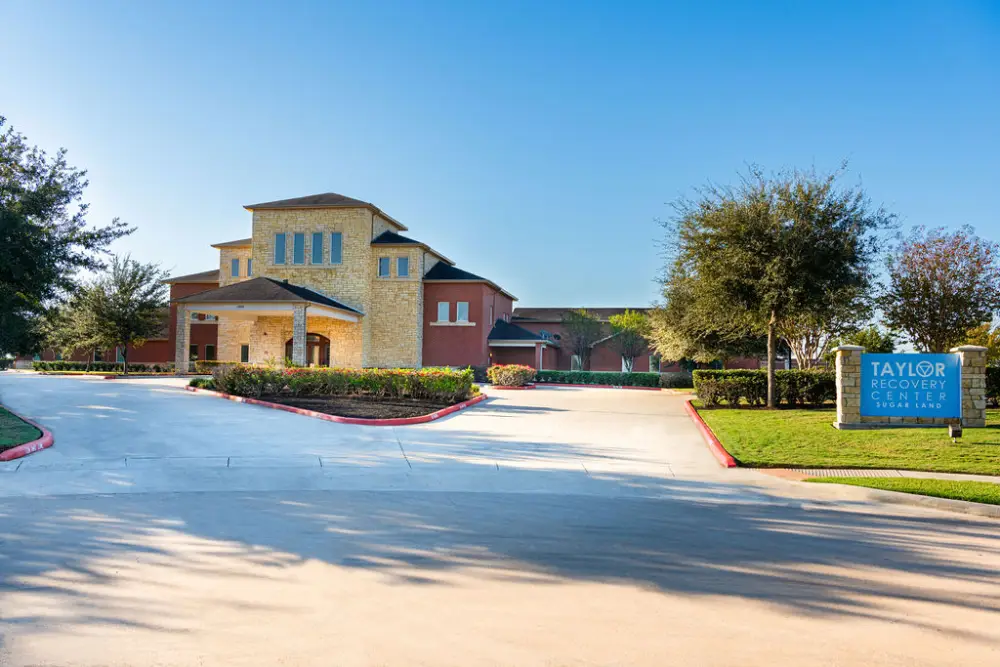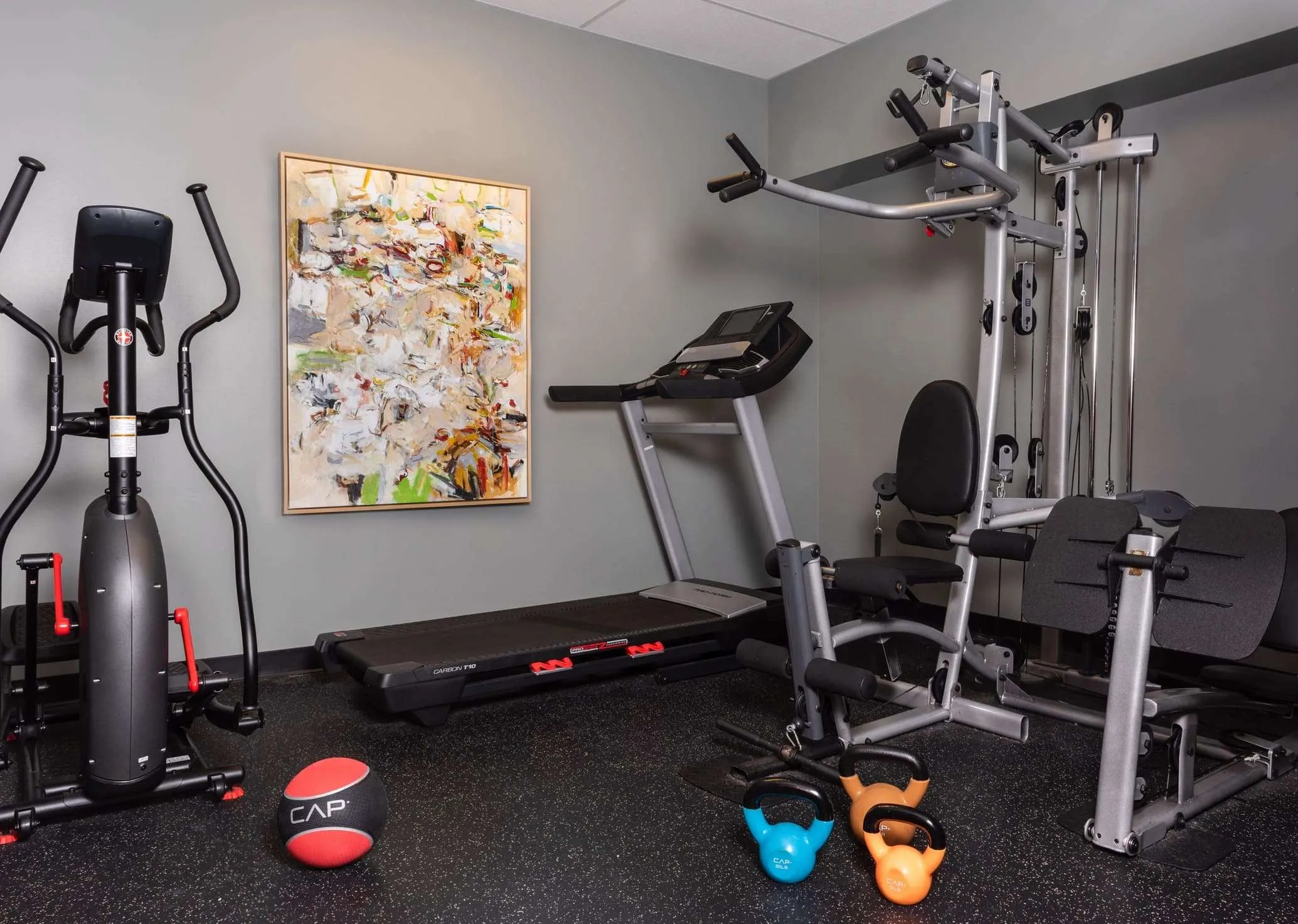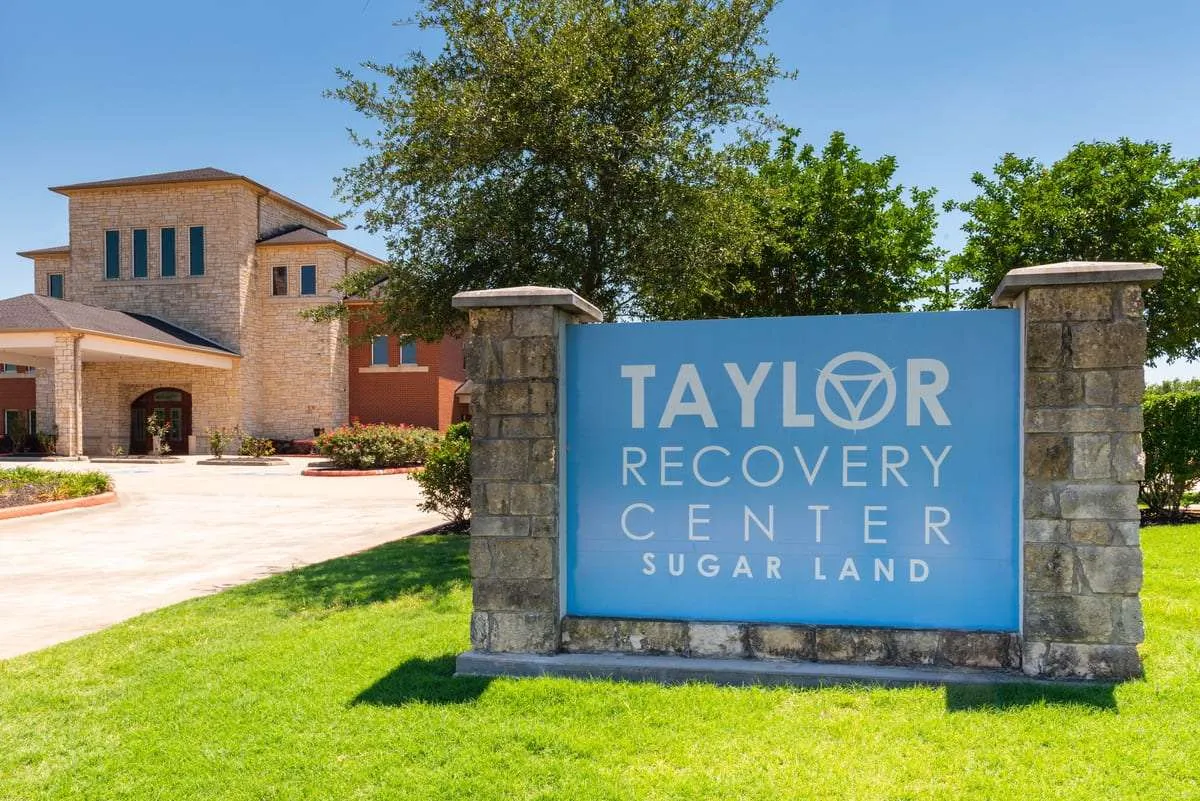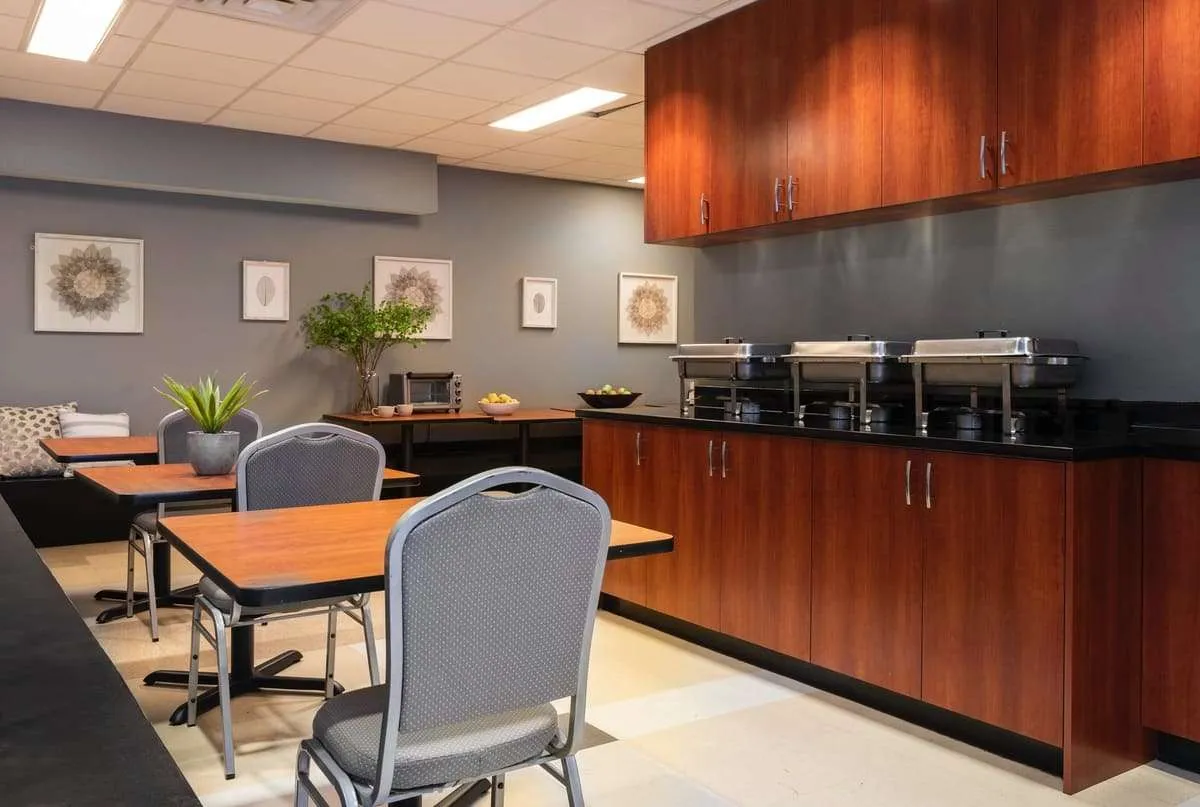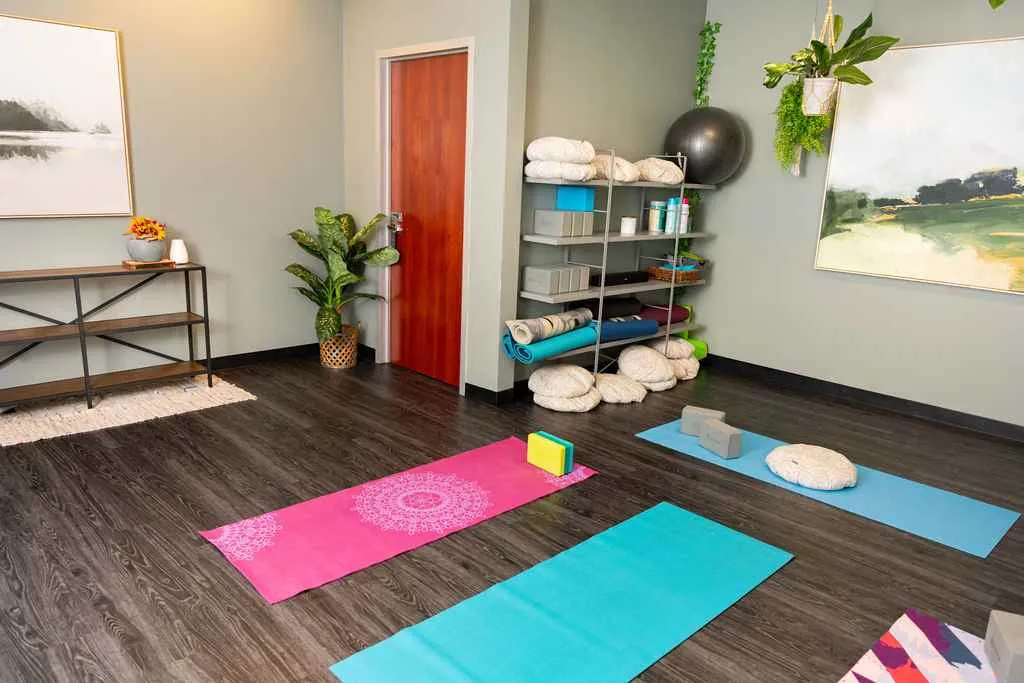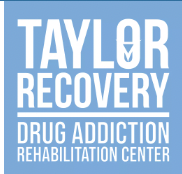Taylor Recovery Center
Overview
Taylor Recovery Center, situated in Sugar Land, Texas, is a premier, pet-friendly facility dedicated to providing luxury drug and alcohol rehabilitation. The center ensures 24/7 medical supervision during detoxification, with FDA-approved medications available to manage withdrawal symptoms and prevent complications.
The inpatient program at Taylor Recovery Center offers a private, home-like environment that facilitates focused recovery. The facility boasts premium amenities, including private rooms and accommodations for pets. Clients engage in intensive, trauma-informed psychotherapy based on Dialectical Behavior Therapy (DBT), encompassing individual, group, and family counseling sessions.
In addition to core therapeutic services, Taylor Recovery Center provides a range of evidence-based complementary therapies to support holistic recovery. These include animal therapy, recreational therapy, experiential therapy, and nutrition therapy. For those transitioning from inpatient care or requiring less intensive support, the center offers comprehensive outpatient programs, including Partial Hospitalization (PHP), Intensive Outpatient (IOP), standard outpatient services, and sober living arrangements.
Accredited by The Joint Commission, Taylor Recovery Center is committed to delivering the highest standards of care within a supportive and luxurious setting.
Taylor Recovery Center at a Glance
Payment Options
- Cash or self-payment
- Self-pay options
- Private insurance
- Blue Cross and Blue Shield Association
- Aetna
Assessments
- Comprehensive mental health assessment
- Comprehensive substance use assessment
Age Groups
- Adults
Operation
- Private for-profit organization
Accreditations
LegitScript:

Only programs and services that have successfully completed a rigorous application process initiated in 2018 can attain LegitScript certification. This stringent evaluation guarantees that only reputable mental health and co-occurring substance abuse treatment providers are eligible to be part of Google's network, ensuring compliance with HIPAA privacy laws.
The Joint Commission:

The Joint Commission, previously known as JCAHO, is a nonprofit organization that accredits rehabilitation organizations and programs. Established in 1951, its mission is to enhance the quality of patient care and showcase excellence in healthcare delivery.
Registration: 625878
Treatment At Taylor Recovery Center

Conditions Treated
Mental health treatment:
Mental health treatment provides a safe and structured environment where individuals can receive professional care and support for their mental health challenges. Within the facility, trained therapists, counselors, and medical staff work together to create personalized treatment plans tailored to each person's needs. Patients might participate in a variety of therapies, including individual counseling, group therapy, and possibly medication management. The goal is to equip individuals with the tools and strategies they need to cope with their conditions and lead fulfilling lives.
Alcoholism:
Alcohol addiction is a condition where someone feels a strong and uncontrollable urge to drink alcohol, often leading to negative effects on their health, relationships, and daily life. To assist individuals grappling with alcohol addiction, various strategies exist. Initially, supervised detoxification may be necessary to ensure a safe cessation of alcohol consumption. Following this, counseling and therapy play a crucial role in addressing the psychological facets of the addiction. Engaging in support groups can also offer a sense of camaraderie and comprehension.
Substance use treatment:
Substance use rehabilitation represents a holistic treatment strategy tailored to aid individuals grappling with drug or alcohol addiction. This comprehensive rehabilitation method encompasses two key aspects: first, addressing the physical dependency, often commencing with detoxification, and second, tackling the psychological triggers through a range of therapeutic techniques. The ultimate aim is to empower individuals to attain and sustain sobriety while providing them with the necessary skills and coping mechanisms to successfully reintegrate into society and lead a life free from substance abuse.
Co-occurring Disorders:
Dual-diagnosis rehabilitation centers often offer the most suitable approach for addressing concurrent mental health and substance abuse issues. These facilities typically employ a team of medical and behavioral specialists who utilize a variety of interventions and create a conducive healing environment to support your journey toward lasting recovery. Their comprehensive treatment approach typically encompasses evidence-based therapies such as cognitive-behavioral therapy, recovery support meetings, 12-step facilitation, psychoeducation, skills training, and group therapy to help you achieve and maintain long-term wellness.

Levels Of Care
Partial Hospitalization Program:
A Partial Hospitalization Program (PHP) is an intensive rehabilitation option, typically designed for individuals with acute symptoms that are challenging to handle but don't necessitate round-the-clock care. PHPs provide structured therapeutic activities, which can include individual and group sessions, and generally operate 3-5 days a week, from approximately 9 am to 3 pm. While some PHPs are residential, allowing patients to stay overnight, others are non-residential, enabling patients to return home each evening. The duration of a PHP can range from 1 to 6 months, and some programs also offer transportation and meals to participants.
Intensive outpatient treatment:
Intensive outpatient programs (IOPs) support clients in maintaining long-term sobriety by providing tailored, high-quality care that adapts to their changing requirements. Clients participate in several treatment sessions each week, typically receiving between nine to 20 hours of outpatient care weekly. As clients achieve stability, the treatment frequency and intensity gradually diminish. Many intensive outpatient rehabilitation centers provide a diverse range of services, such as addiction counseling, training in life skills geared towards recovery, and the option for medication-assisted treatment (MAT). Additionally, evidence-based complementary therapies are frequently integrated into the program.
Luxury Treatment:
Luxury rehab centers offer upscale treatment environments for individuals seeking recovery from addiction or other behavioral disorders. These centers combine top-tier medical and therapeutic care with lavish amenities, ensuring patients receive the utmost comfort and personalized attention. Often set in picturesque locations, these centers prioritize privacy, holistic well-being, and world-class facilities to facilitate a rejuvenating healing experience.
Detoxification:
Detoxification, often called detox, is like a reset button for the body after someone has been using drugs or alcohol. Its main job is to help people who want to quit these substances by easing the discomfort they might feel when they stop. Think of it as a way to clean out the harmful stuff in the body when someone has been using drugs or alcohol too much. Detoxification aims to make the process of quitting safer and less painful for the person.
Aftercare:
Finishing a drug or alcohol rehab program is not the conclusion of substance abuse treatment but rather a pivotal step toward long-term recovery. Aftercare encompasses devising a sustainable recovery plan coupled with enduring support. It may include sober living environments such as halfway houses, career counseling, and connecting patients with community support programs like Alcoholics Anonymous (AA) or Narcotics Anonymous (NA). This holistic approach ensures a smooth transition into a substance-free life while bolstering resilience against relapse.
Halfway house:
A sober living residence provides a nurturing atmosphere where individuals in recovery offer each other mutual support while sharing household duties. Residents actively engage in 12-step programs and hold one another accountable for maintaining sobriety. To continue residing in either a men's or women's sober living environment, individuals must stay free from drugs and alcohol, actively contribute to household responsibilities, attend support group meetings, and contribute to the living expenses of the home.
Outpatient:
Outpatient treatment in a rehab center offers flexible therapy sessions, typically ranging from 1-3 hours per week, allowing individuals to continue daily activities while receiving care. In contrast, intensive outpatient programs demand a more rigorous commitment, often involving 9-15 hours weekly, providing a more immersive therapeutic environment without the need for inpatient stays.
Hospital inpatient/24-hour hospital inpatient:
The 24-Hour Hospital Inpatient for Addiction Treatment program offers comprehensive, round-the-clock medical care and support for individuals grappling with substance use disorders and addictions. Situated within a medical hospital environment, this specialized inpatient program is designed to address both the immediate and long-term needs of patients, ensuring their safety, stabilization, and comprehensive recovery.

Treatment Modalities
Group counseling:
Group Counseling is a therapeutic approach where individuals come together under the guidance of a trained counselor to share experiences, provide mutual support, and gain insights. It fosters a sense of community, promotes understanding through diverse perspectives, and offers personal growth and problem-solving strategies.
Trauma-related counseling:
Trauma therapy delves into past traumatic events that might be influencing a client's current life experiences. Often, trauma serves as a significant precipitant or underlying cause of addiction. Such traumas can arise from childhood sexual abuse, domestic violence, growing up with a mentally ill parent, early parental loss, and experiences of sexual assault in teen or adult years, among other circumstances. Trauma therapy aims to aid the individual in processing and navigating beyond these traumas, guided by the expertise and empathy of skilled mental health specialists.
12-step facilitation:
12-Step Facilitation is a structured approach employed in rehab facilities to guide individuals through a 12-step program, such as Alcoholics Anonymous or Narcotics Anonymous, to support their recovery from addiction. This facilitation focuses on acceptance, surrender to a higher power, and engagement in a community of support. By meticulously working through each step, individuals are encouraged to develop self-awareness, seek amends, and cultivate a sober, healthier lifestyle through ongoing participation in a recovery-oriented community. This method aims at ensuring a lasting recovery by instilling a sense of accountability and fostering a supportive network of like-minded individuals.
Individual psychotherapy:
Individual therapy is a one-on-one therapeutic interaction between a therapist and a client to address personal challenges, foster self-awareness, and promote mental, emotional, and behavioral growth. This setting provides a confidential and supportive environment for individuals to explore their thoughts, feelings, and behaviors, identify goals, and develop coping strategies. Individual therapy can be beneficial for a range of concerns, including anxiety, depression, stress management, relationship issues, and life transitions.
Assertive Community Treatment:
Assertive Community Treatment (ACT) offers a proactive approach to aiding individuals with significant mental illnesses and/or substance use challenges by delivering services directly in their homes. Rather than institutional care or outpatient programs, professionals such as social workers, psychiatrists, and counselors visit the patient's residence for treatment. Primarily aimed at individuals with severe conditions like schizophrenia or bipolar disorder, some of whom may also struggle with substance abuse, ACT provides continuous, multidisciplinary support akin to a psychiatric unit but within the familiar surroundings of the patient's home and community.
Dialectical Behavior Therapy:
Dialectical Behavior Therapy (DBT) is a form of psychotherapy that blends cognitive-behavioral approaches with mindfulness strategies. It is particularly effective in treating addiction, as it addresses the underlying emotional pain and destructive behaviors that often accompany substance misuse. Through enhancing emotional regulation, distress tolerance, interpersonal effectiveness, and mindfulness, DBT equips individuals with the coping skills necessary to maintain sobriety and improve their overall quality of life.
Family counseling:
Family Counseling is a therapeutic approach that seeks to address and improve communication, understanding, and dynamics within a family unit. By addressing conflicts, emotional distress, and behavioral challenges, a trained therapist provides guidance and tools for family members to strengthen bonds, resolve issues, and foster a healthier family environment.
Experiential Therapy:
Experiential therapy is a form of therapy in which clients are encouraged to surface and work through subconscious issues by engaging in real-time experiences. Experiential therapy departs from traditional talk therapy by involving the body, and having clients engage in activities, movements, and physical and emotional expression. This can involve role-play or using props (which can include other people). Experiential therapy can help people process trauma, memories, and emotion quickly, deeply, and in a lasting fashion, leading to substantial and impactful healing.
Animal Therapy:
Animal Therapy, often referred to as Animal-Assisted Therapy (AAT), is an integrative therapeutic approach wherein trained animals partner with healthcare professionals to assist patients in meeting their therapeutic goals. Leveraged in behavioral health settings, AAT harnesses the unique human-animal bond to facilitate emotional, cognitive, and social improvements. Animals have demonstrated an innate capacity to reduce stress, alleviate anxiety, and enhance interpersonal skills, making them invaluable companions in addressing various psychological and emotional disorders.
Nutrition Therapy:
Nutrition therapy, often referred to as medical nutrition therapy (MNT), harnesses the power of diet to address physical, emotional, and medical challenges. Expert nutritionists or registered dietitians craft specialized dietary strategies for individuals, guiding them to enhance both their physical and psychological well-being through food choices.
Recreational Therapy:
Recreational Therapy, also known as therapeutic recreation, is a specialized form of therapy that utilizes recreational activities to enhance an individual's physical, emotional, cognitive, and social well-being. It aims to improve and maintain overall health, well-being, and quality of life. Therapists design individualized intervention plans that align with their clients' specific needs and interests, using activities such as sports, music, arts and crafts, dance, and outdoor adventures as therapeutic tools. This form of therapy is beneficial for various populations, including those with physical disabilities, mental health conditions, and age-related challenges.
Ancillary Services
Special Programs
- Clients who have experienced trauma
Contact Information
DISCLAIMER: The facility name, logo and brand are the property and registered trademarks of Taylor Recovery Center, and are being used for identification and informational purposes only. Use of these names, logos and brands shall not imply endorsement. BetterAddictionCare.com is not affiliated with or sponsored by Taylor Recovery Center.
